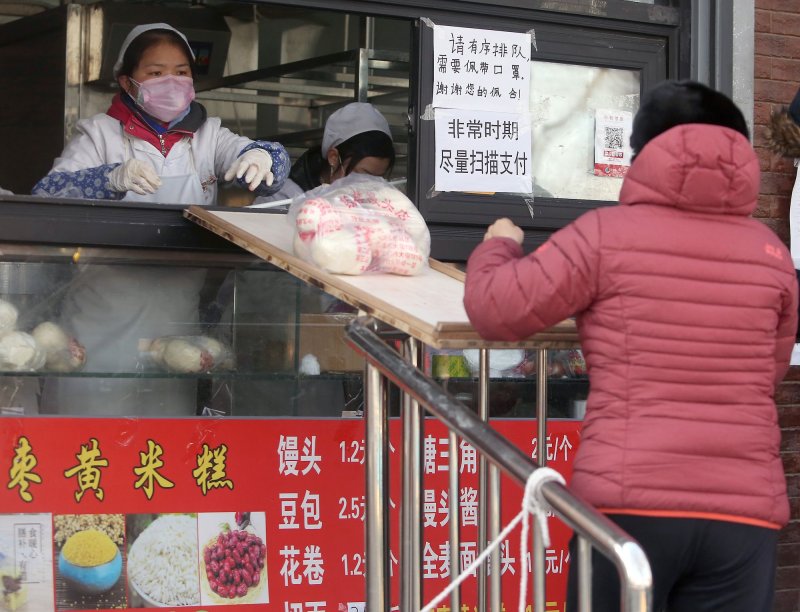An employee at a Chinese dumpling shop passes orders to waiting customers over a small 'bridge' due to the threat of spreading the deadly coronavirus in Beijing on Monday, February 17, 2020. Photo by Stephen Shaver/UPI |
License Photo
Feb. 20 (UPI) -- As fast as the novel coronavirus, or COVID-19, outbreaks appears to be spreading, the development of drugs to treat it may actually be keeping pace, officials with the World Health Organization said Thursday.
The progress in research and development, based on two ongoing clinical trials in China, comes as Iran on Wednesday announced five confirmed cases of the disease in the country -- all in people with a history of travel to China -- and that two people there have died.
That brings the total number of affected countries to 26, according to WHO director-general Tedros Adhanom Ghebreyesus. To date, these countries have confirmed a total of 1,076 cases, compared to the nearly 75,000 -- with more than 2,000 deaths -- in China alone.
"The data from China continues to show a decline in new confirmed cases," he said, adding that more than half the cases outside China have involved passengers on the Diamond Princess, the cruise ship that had been held in quarantine in a port in Japan until earlier this week.
WHO officials Wednesday started weekly meetings with diplomats from member nations stationed in Geneva to discuss the outbreak and response measures.
Both the WHO and the United Nations have also agreed to activate the UN's Crisis Management Team, which will begin efforts working with the Africa Center for Disease Control particularly focused on preparing the continent for the "potential arrival of the virus," Adhanom said.
COVID-19 poses a "serious danger" for countries with weaker health systems, he added. On Wednesday, epidemiologists writing in The Lancet indicated that the African nations Egypt, Algeria and South Africa are at high risk for an outbreak.
According to Janet Diaz, lead for Clinical Case Management in the WHO's Health Emergencies program, the slowdown in new cases, at least in China, comes just as testing of potential treatments begins to ramp up. She said preliminary results from two ongoing clinical trials -- one involving the HIV combination regimen lopinavir/ritonavir and the other using the antiviral remdesivir -- are expected in roughly three weeks.
Both trials are being conducted in China, where a team of experts led by the WHO has been "on the ground" since last weekend, Adhanom said.
That team includes epidemiologists, virologists, public health specialists and others from Singapore, Japan, Nigeria, Russia, Germany and the U.S. Centers for Disease Control and Prevention, among other countries, and it is taking an active role in disease surveillance as well as investigations into the origins of the outbreak and response efforts, he added.
Meanwhile, Adhanom has asked 12 manufacturers of personal protective equipment, or PPE, to assist in efforts to protect health workers from COVID-19 as they care for patients. At least 1,600 healthcare workers in China have been sickened with the virus since the outbreak began.
"I've written to chief executives of manufacturers of personal protective equipment to seek their cooperation to ensure supply to protect health workers," he said, though he did not specify which manufacturers or the commitments they have received.
Efforts to slow the spread of "misinformation and conspiracy theories" on the COVID-19 outbreak online haven't been as effective so far, Adhanom said. WHO has met with executives at Facebook, Google and other social media platforms to address the issue, he said.
"They are aware of the problem and have pledged to help," he added.
Earlier this month, Facebook said it is working with a network of third-party fact-checkers to review information on COVID-19 posted to the platform.
If information is deemed false, Facebook said in a blog post it would to limit its spread on both Facebook and Instagram. The company also plans to remove information that global health organizations and government health agencies have determined to be untrue.















